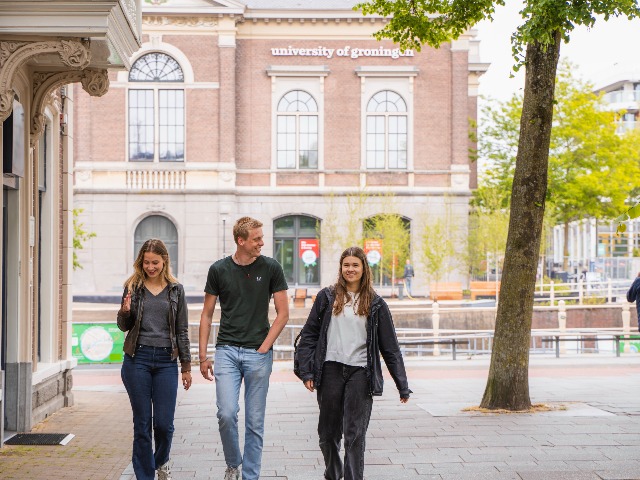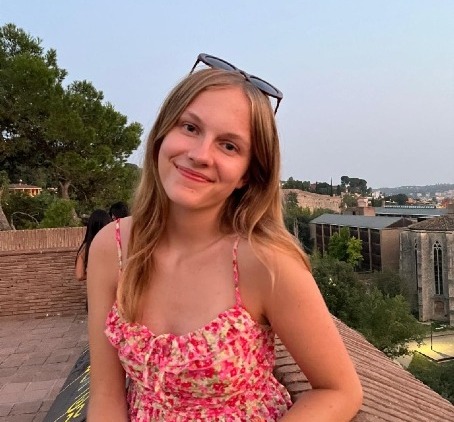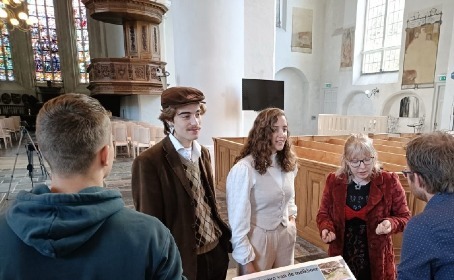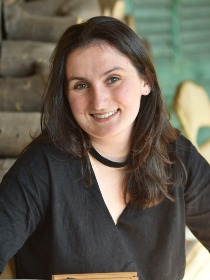Three Tracks, Three Ways to Make an Impact: GRL Majors Explained

Global Responsibility & Leadership is an interdisciplinary bachelor that lets you explore broadly while specialising in what interests you most. Choose from three majors: Psychology & Global Health, Ecology, Energy & Climate, and Politics, Philosophy & Economics. Curious about the differences? Read three short interviews below, and feel free to email us if you have more questions!
Three Students, Three Majors: Meet Elisa, Yentl, and Laura

Elisa: I am Elisa, 20 years old, 2nd year GRL student from the Psychology and Global Health (PGH)* major. I come from Meppel, in the Netherlands.
*Kindly note that as of the 2025/2026 academic year, this track will be renamed Culture, Psychology, and Global Health

Yentl: I am Yentl, a second year student who is majoring in Energy, Ecology and Climate (EEC). I have a lot of hobbies outside of university also tied to my major, such as my love for being outside in nature, theater, and activism. I am originally from Leeuwarden.

Laura: I am Laura from Portugal, and I am a first year GRL, going to take the Politics, Philosophy and Economics (PPE) major.
What is your major about?
Elisa: My major is about human behaviour, with a focus on social psychology, and health systems world wide. So to put it in a few words, the social wellbeing of humans.
Yentl: It's about climate, energy, the energy transition, climate adaptation, and about the earth systems. It combines everything and looks at how they interact with each other and the political side, so ultimately how the climate and climate-related decisions affect, and will affect, us.
Laura: My major has 2 tracks: politics, which introduces us to political theory, and economics, which introduces you to foundational economic knowledge.
Why did you choose it?
Elisa: I had doubts at first, because I like all the majors offered, and was interested in everything. However, I realised that I really like psychology, which I did not know before studying GRL. I really discovered this throughout the programme, and I also really like the Global Health track. Overall, the reason behind why humans make certain decisions interested me, understanding the structure of society. Plus, it's so broad and applicable to every field, because human behaviour and systems are always interconnected to other fields - which makes it interesting to study.
Yentl: My real reason is, I did not want to do Politics Philosophy and Economics (PPE), and I am very interested in the energy transition. I really liked the foundation courses, and I think the energy transition is one of the most important developments for us humans right now. Also, climate change is one of our biggest responsibilities. I wanted to contribute to this.
Laura: I originally wanted to study international relations, but then I found GRL which resonated with me due to its mindset and philosophy. It is more hands-on, which is why I choose GRL over other programmes, but I still keep my original passion. I strive to be aware of problems in the world and know different ways in which we can intervene and create impact. I would like to work in an NGO and so PPE felt like the perfect fit.
What was your favourite course, and why?
Elisa: I am now taking Psychological Perspectives on Leadership and Organisations (PPLO), and this is my favorite course! It connects psychology to leadership, and focuses on the many aspects of leadership. I now understand why we lead a certain way and what makes certain aspects of leadership effective.
Yentl: Homes and Cars was my favourite! I liked the frameworks that we were introduced to such as practice theory. It was something I was familiar with from my childhood, this notion that we have a responsibility to change our practices to be more sustainable. What stood out in this course was that we were able to partake in the week of the region! Although there were some mishaps, the idea of spending a week on a case study was really cool. The assignment I had was to inform people about the practices of a local farmer.
Laura: Probably History of Economic Thinking, which is unexpected because I used to have a bitter relationship with economics. I was not excited for that part of the major, but I ended up having the space to learn more about how economic decisions are made and how we think of the economic world of today. I can now connect the economic thinkers we hear about to various theories and concepts. It opened up my own prejudices. Also, Marianna's lecture was very comprehensive, which was helpful for someone like me who had no prior knowledge.
Can you give an example of a topic you learned about in one of the courses?
Elisa: I got to present on gender and leadership in PPLO, and here you get to see not only how gender roles affect leadership, but how this is founded in psychology, and so why we have certain biases.
Yentl: Systems thinking is a good basic approach we learned in Earth Systems course, so how to think systemically. It is applicable in a broader manner, which is very important.
Laura: In Key Political Thinkers, I learnt that unfortunately a large part of the key thinkers and thoughts are "from men, for men." Theories as prominent as the social contract don't encompass women at all. We had a whole class on the feminist perspective on the social contract theory, and how men can take advantage and force women into a certain role. This course really opened up my eyes to how male centric the field is.
Did you have a favourite assignment? If so, what made it stand out?
Elisa: In Applied Social Psychology (ASP), we did an assignment where we had to come up with an intervention to change human behavior. My assignment was about promoting the use of shampoo bars as opposed to plastic bottles to reduce microplastics. In this class, we looked at how to change something to achieve our intervention through our understanding of human behaviour. It made psychology very practical, and we got to actually see the impact of our assignment.
Yentl: In petrocultures, I wrote a paper on 15-minute cities comparing the implementation in Barcelona and Munich. Barcelona was a good example, while Munich was less successful, let's say. It really prepared me for the Living Lab, and I am sure, although later, for the thesis. It was nice to have so much freedom in an assignment to delve into what we were interested in and have the space to be responsible for such an assignment.
Laura: Also for PPIR we had the Think Big assignment, so we were offered more space for creativity, as we were asked to talk about theory but convey it in a creative manner. We were really given no limits! I focused on period poverty in Ghana, where the price difference between minimum wage and menstrual products is very large and a pressing issue. In our assignment, we focused on solutions, and provided policy recommendations. However, to present this to the class, myself and my group set it up as a murder mystery game. Everyone was a stakeholder and the goal was to figure out why girls weren't attending school on that day. We gave them information on safety, transport, family issues to see if these would be sufficient causes for their absence but no, in the end the class discovered it was the price of menstrual products.
What is one unique or memorable thing you did as part of your major?
Elisa: One of the memorable things of the CPGH major is that there is a lot of space to share your opinions. Because of the diverse background of the people on campus, you learn a lot from classmates, which is applicable to the major. At the end of the day you understand the driving factor behind things in daily life.
Yentl: Again, the week of the region, it was very memorable. It was nice to do field work and speak with local stakeholders. It made the theory less abstract, it's more practical and overall it really brought the theory and practical reality together.
Laura: For History of Economic Thinking, there was one assignment where we had to record a 20-minute podcast about inequalities in a group of 3. We were supposed to identify: 3 causes, 3 consequences and adopt one of the economic thinker’s lenses and propose 3 policy recommendations. We went to the media lab on campus and it was really fun to do something different, that combines this very academic information with creativity.
How do you see yourself using what you have learned in the future?
Elisa: I really want to combine using the understanding of human behaviour and environmental knowledge to make a change. I also took a course in Social and Cross Cultural Psychology in Groningen because I wanted to deepen my understanding of social psychology, I really liked it. I am not sure yet how I will combine everything in the future for my Master's but I would definitely like to do something in global health or psychology.
Yentl: I want to go either into urban planning, and explore how to make cities sustainable, or be a decision maker like an advisor or local politician. I felt we have touched upon these concepts in class, but I really want to take this knowledge a step further. I want to apply production, storage, how the climate has impacts on our surroundings and the energy transition.
Laura: What really drives me is the idea of using my life and time to create a positive impact in someone else's life. I am privileged, and for me acknowledging this privilege is not enough, I want to do something with it. So I am oriented towards working with NGOs who can allow me to do so. I think what PPE is teaching, and has taught me so far, is to look at everything critically. The programme gives you a lot of space and independence to take control over your own assignments and time, and do with it what you can and what you want. You can really take advantage of how much autonomy you have. A core skill I learnt is critical thinking, and computers cannot do that, it's stimulating and using your own cognitive faculties. All of this is important, especially if you want to work in humanitarian aid and NGOs.
What course are you still looking forward to?
Elisa: Psychology of Culture and Diversity and Planetary Health! I am looking forward to both.
Laura: I am excited for Global Environmental Economics, because it will combine two interests of mine, the politics but also the responsibility and leadership we have towards sustainability, and I am also excited to learn more about the concept of degrowth. I would not have imagined being interested in the economics track when I first started!
Curious to learn more about the programme?
-
Visit our BSc Global Responsibility & Leadership webpage;
About the author

Alice Haywood is French, English and Irish, and is currently undertaking both the Psychology and Global Health and Energy, Ecology and Climate majors of the BSc Global Responsibility & Leadership at Campus Fryslân, University of Groningen. She served as both Diversity, Equity and Inclusion and Programme Committee member in the academic year 2024/2025, as well as sat on the board of Campus Fryslân's Green Office. Aside from her studies at Campus Fryslân, Alice is an entrepreneur and works hard on her app AutiMelody.

